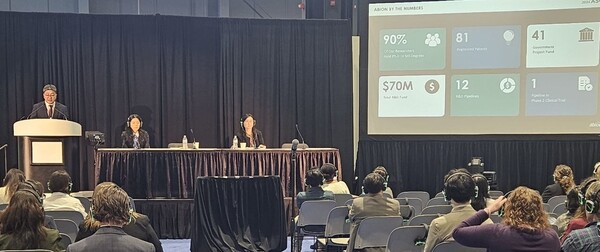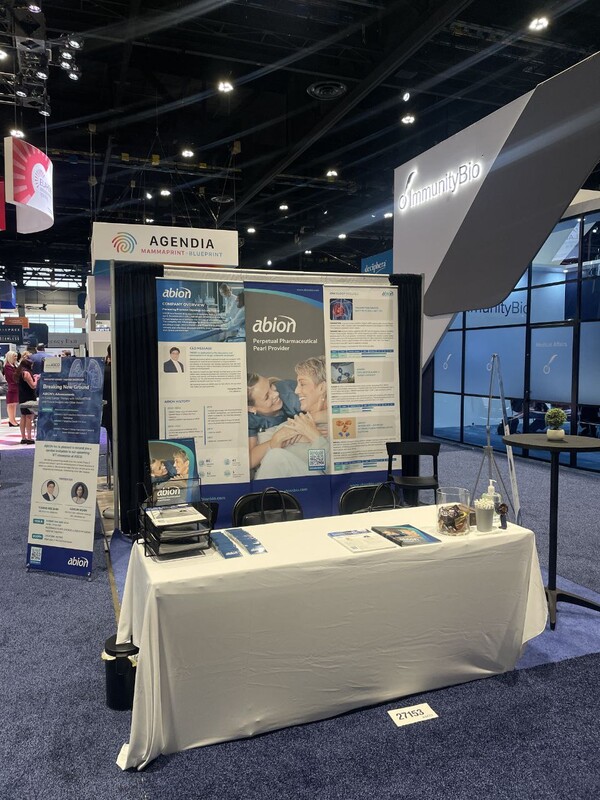Vabametkib, with only 10% of patients experiencing Grade 3 or higher adverse events, demonstrates strong potential as a global best-in-class treatment
Abion, a Korean biotech listed on Kosdaq, said it unveiled encouraging cut-off data from its phase 2 clinical trial of vabametkib (ABN401), a drug targeting the hepatocyte growth factor receptor (c-MET), and introduced a combination therapy strategy with vabametkib and lazertinib at the 2024 ASCO Annual Meeting.
The presentation, part of the Industry Expert Theater (IET) session titled “From Lung Cancer to Expanding Our Oncology Horizons,” was delivered by Abion CEO Shin Young-kee and CMO Han Lim-moon. During the session, they also introduced ABN501 and ABN202.

Abion positioned itself as a company broadening its scope from lung cancer to the entire oncology field, highlighting vabametkib's superior safety and response rates compared to global treatments.
The company emphasized that Abion was the only Korean company participating in the IET, alongside global pharmaceutical giants such as Novartis and Merck.
Abion’s vabametkib demonstrated a favorable safety and response profile, positioning itself as a potential global best-in-class treatment. Notably, treatment-related adverse events (TRAE) greater than Grade 3 were reported in only 10 percent of patients, significantly lower than the rates observed with other treatments such as Tabrecta (37.6 percent) and Tepmetko (28 percent).
The phase 2 trial data revealed an objective response rate (ORR) of 54 percent and a median progression-free survival (mPFS) of 11.6 months.
CEO Shin highlighted that the mPFS figure, based on data as of May 9, is expected to increase as the trial progresses. Currently, 34 patients are enrolled in the global clinical trial, with enrollment proceeding smoothly according to the plan.
Vabametkib's promising results were further underscored by a case where tumor size was reduced by approximately 90 percent within 16 days of administration under the Expanded Access Program (EAP) granted by the Ministry of Food and Drug Safety.
In addition to vabametkib, Abion presented the clinical design for a combination therapy involving vabametkib and Johnson & Johnson’s lazertinib, a third-generation epidermal growth factor receptor (EGFR) tyrosine kinase inhibitor (TKI).
The first patient enrollment is anticipated in the fourth quarter of this year.
Abion emphasized that safety issues have been reported in current combination trials of EGFR TKI and c-MET TKI, and no such treatment has yet been approved.
Therefore, with vabametkib’s high safety profile, positive clinical results are expected, the company said.

Abion also introduced ABN501, the only existing Claudin-3 protein antibody, currently in the preclinical stage and under a joint research partnership with the National Cancer Institute (NCI), a U.S. federal government's principal agency for cancer research and training. An investigational new drug (IND) application for ABN501 is planned for submission in the second half of next year.
In addition, Abion showcased its novel antibody-cytokine fusion protein (ACFP) platform technology, ABN 202. This new treatment strategy aims to overcome the limitations of existing antibody-drug conjugates (ADCs) and other immunocytokines, particularly in patients with ADC resistance and low antigen expression.
In a related development, Abion also participated in BIO International Convention 2024 (BIO USA 2024), held from June 3-6 in San Diego, Calif. During this event, Abion engaged in discussions on investment and licensing opportunities, exploring partnerships with global pharmaceutical companies and investors.

